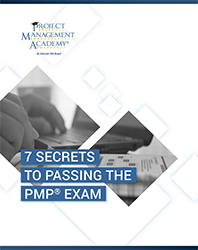
In recent years, project management has emerged as one of the world's prevailing new professions. The Anderson Economic Group projected in a recent survey that an average of 1.2 million new project management positions will need to be filled each year until 2016, with healthcare, infrastructure development, and green technologies cited as some of the industry's fastest-growing niches. This rapid growth, coupled with competitive industry salaries, has incentivized many employees and students to consider a career in project management. But with so many new arrivals to the field, motivated project managers are seeking ways to distinguish themselves from the pack. For many, the Project Management Professional (PMP)® certification holds the answer.

What is the PMP certification?
The Project Management Professional® certification is a globally recognized credential for project managers and is sanctioned by the Project Management Institute (PMI)®. Although a PMP certification is not required in order to work as a project manager in most roles, certification reflects an individual's technical skill, instills trust in prospective clients and employers, and often serves as justification for higher pay or promotion. In fact, PMI's most recent salary survey asserts that the median PMP-certified project manager will net $110,000/year, which is nearly 20% more than their non-certified counterparts.
What requirements exist to sit for the PMP examination?
To be eligible to sit for the PMP exam, a candidate must meet one of the following two criteria:
A high school diploma AND Minimum of 60 months of unique non-overlapping professional project management experience
-OR-
A Bachelor's Degree AND Minimum of 36 months of unique non-overlapping professional project management experience
Additionally, each candidate must engage in 35 contact hours of formal project management training. This particular requirement can be satisfied a number of ways, including training school, a company-sponsored or employer program, a PMI chapter or community, or a college/university training program.
I'm eligible. Where do I begin?
After eligibility and intent are determined, it will be time to prepare for the PMP exam! It is highly recommended that you enroll in a formal, PMI-approved project management training course. In addition to satisfying the eligibility requirements for contact hours mentioned above, these courses are tailored to help you navigate through PMI's official handbook, A Guide to the Project Management Body of Knowledge (PMBOK® Guide). The pass rate for the PMP exam is roughly 65%, so be sure to schedule well in advance and take the test preparation process very seriously!
In what format is the PMP examination?
The PMP exam is available in both virtual and paper-based formats with a time requirement of 230 minutes. There are 180 questions, and the three domains are given the following weights:

A note about PDU's
Upon successful completion of the PMP examination, a project manager's certification must be maintained by periodic continuing education credits known as Professional Development Units (PDUs). A PMP-certified project manager must complete 60 PDUs every three years. As with the pre-exam contact hours, there are a myriad of ways to acquire these hours through PMI-certified and independent activities. It is important that you keep a record of this supplemental instruction, however, as you will use it to report to PMI and need it in the rare event of an audit.
The bottom line
The PMP certification is rapidly becoming the most widely accepted, implemented, and required certification in project management, an industry which itself is witnessing substantial growth. Whether seeking to increase marketability to employers, reputation with clientele, or yearly salary, the PMP certification is the perfect choice for aspiring project managers everywhere.


 New Horizons
New Horizons
 Project Management Academy
Project Management Academy
 Six Sigma Online
Six Sigma Online
 Velopi
Velopi
 Watermark Learning
Watermark Learning
 Login
Login





 New Horizons
New Horizons
 Project Management Academy
Project Management Academy
 Velopi
Velopi
 Six Sigma Online
Six Sigma Online
 Watermark Learning
Watermark Learning